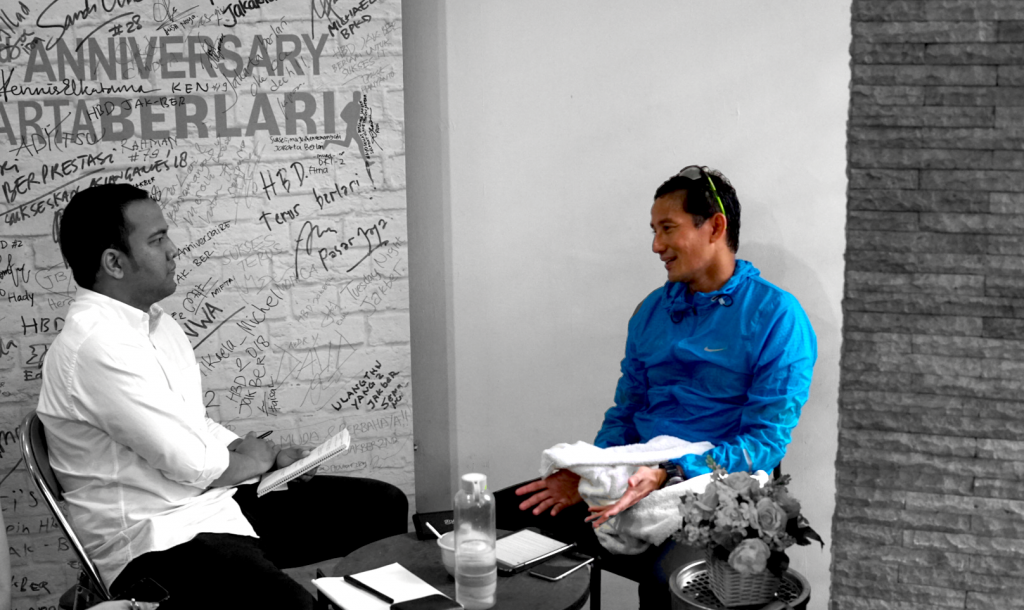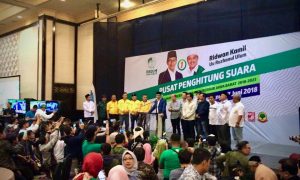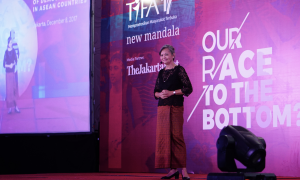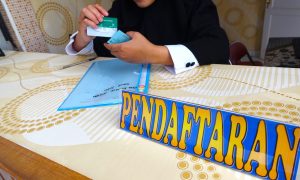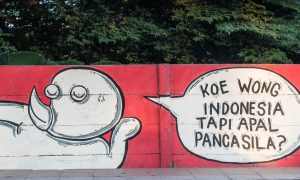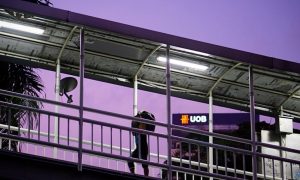Editor’s note: On 3 March 2019, vice-presidential candidate Sandiaga Uno made himself available for an interview with New Mandala Indonesia Correspondent Fellow Aichiro Suryo Prabowo, on the topic of economic policy. They were joined by New Mandala’s editor Liam Gammon [LG], and a campaign advisor. Below is a transcript of the highlights from the interview.
• • • • • • • • • • • •
GDP growth under Jokowi has been around 5%. If you were elected, what’s the growth rate that you and Prabowo want to achieve?
Well first of all, we have to appreciate the development plan that the government [has] tried to achieve. And it’s very much lower than the promise of 7%-plus growth during the 2014 campaign pledge from the president. But without structural reform, you will not be able to get anything past 5%. And for us, it is I think the first year we would be very realistic in terms of the target; with some tweaks we would probably aim at 5.5 to 6%, but towards the end I think it’s possible that we’d go back to the 6–7% range.
But I want to change the mindset of the people: it’s not growth for the sake of numbers, but we need to inject new ideas to link growth to sustainability, growth to inequality reduction, growth to job production, growth to maintaining stability on food prices, growth to the welfare of farmers, growth that makes sure that spatial inequalities appear to be low. Right now, despite the efforts of the current administration, you see Java as the centre of growth. With the exception of South Sulawesi, the rest of the country is not, basically, enjoying the same type of growth that Java has. […]
Prabowo is quite the economic nationalist. How do you reconcile that with the need for foreign investment or international trade to achieve the kind of growth rate you mention?
Sometimes Pak Prabowo is misunderstood, for his very fiery speeches. But, you know, at the end of the day he’s a very rational, logical person. He wants Indonesian farmers to be able to fulfil self-sufficiency in food, rice for instance, basic food staples.
But he’s very rational. If we don’t have the production capabilities, and we need to feed our people, and we need to make sure that prices are not skyrocketing, we need to open up for international trade. But we will not do it like this: we do not want to do it by quota. We already said that wanted to do it: just open it up, everybody can import. Not people with close proximity to power. People who want to import Australian cattle? So be it. We’re going to open it up but with a tariff, and the tariff is basically our tool to make sure that if we don’t have ample supply, we lower the tariff so more and more people import, and there’s competition. Right now, people only with close proximity to power have the quota.
[…] So we need investments…that create jobs for Indonesians. Investments that bring quality technology, world class technology. Investments that ensures that there is technology transfer. Investments that would enable us to project 5, 10, 15, 25 years ahead. Investment that doesn’t come with debts that will strangle us. So we’re very realistic that we need investment, that we need international trade. But we want to make sure that we build the country’s strength on the production capability side.
So, you’re not against inviting foreign investment—
—No! I manage foreign capital. I started the private equity industry here. Without foreign investment, we won’t be able to build industries, we won’t be able to attract technology, we won’t be able to create quality jobs, so we’re very realistic. And we will make sure that those investments that come in will benefit Indonesia and average Indonesians.
On foreign investment, which countries do you see as potential strategic partners?
I think that Pak Prabowo says that “one thousand friends is not enough, one enemy is just too many”. So we would like to invite, and we don’t want to do a like-and-dislike. We basically would invite all the investors from friendly countries that share the same belief that would enable Indonesia’s capability to grow and to aim [to be] a developed country, to boost Indonesia’s competitiveness, to create jobs. Again, Prabowo-Sandi is about jobs and prices. So investments that create jobs and stable food prices, we definitely would welcome.
What about China?
Of course. China is going to be the largest country by way of economy. We need to be friends with China. We need to be friends with the US. We need to be—in particular we need to be friends with Australia, because you can choose your friends, but you can’t choose your neighbours—so we’d like to invite investment also from Australia, not only from the mining industry, but also agriculture, healthcare, you know, we’d like to—
—so does that mean a specific tinkering with the Negative Investment List?
—definitely, definitely. We would actually like to cheer what the [Jokowi] government was going to do [a reference to the government’s recent flagging of changes to the Negative Investment List—ed]. And we want to see, if it doesn’t kill the SMEs, if it improves our economy, we’ll support it. But I guess, the politics gets in the way. Somebody wants to get re-elected that badly and withdrew. Normally, tough economic conditions make good policy, because people are forced to make good economic policy. But the election gets in the way, so there you are. You get flip-flops. […]
You’ve mentioned that you would like to have more private sector involvement in infrastructure development. Do you agree with privatising public goods, in particular infrastructure?
It depends. Infrastructure that has huge commercial value, high attractiveness to private investors, yes. Toll roads, definitely. I would open up more for the likes of Macquarie. They’re good at infrastructure, they’re the best infrastructure player. Equis from Australia, those big names, they have long term funding, they have experience investing in other parts of the world, they can bring in the best practices here. But infrastructure that’s really needed for the people, for instance agricultural infrastructure, that must be [inaudible—ed]. Some we could use the public-private partnership scheme, availability payments, concession schemes.
And your next question will be: how do make sure that it’s properly governed? Make it transparent. Make it an international open tender. Invite the World Bank. I participated in the Central Java power plant, it’s touted as one of the best public-private partnerships [a reference to PT Adaro Energy’s involvement in the controversial Batang coal-fired power station—ed]. It’s very open, the government can chip in on the land acquisition, the likes of IFC, World Bank, or AIIB from China could be invited to co-invest alongside other investors, making sure that there’s the governance, and there’s proper technical know-how. Meaning not cronies being given [projects]—and Prabowo and myself understand, we have a lot of friends in the business community because we’re both businessmen, and we understand also who the real players are in the infrastructure sector. Not [just] any investors are experienced in infrastructure. Astra is an experienced investor; Saratoga, my old company—they all make money when they come to invest in infrastructure because they understand that infrastructure is a long term project and needs very smart structuring in terms of financial funding for the project.
Since you mentioned Saratoga—how would you ensure that there would be no conflict of interest during the project procurement process? Will you retain or let go of your shares in your companies?
I am already in the process of liquidating my shares in my companies. I think I’ve been in business for more than 20 years, I’ve been very blessed. God has given me so much wealth. It’s time for me to give back and contribute to my country, so in order for us to ensure also that there’s no apparent conflict of interest—because I understand, when I was in DKI, there were a lot of questions [perhaps a reference to PT Recapital’s ownership of water utilities in Jakarta—ed]. And even though I made it transparent, and I already said that if project tenders involve companies that I’m involved in I’m going to abstain, but still, you cannot escape people linking my companies…
So it’s my intention to liquidate my holdings in the companies that I’m involved in, and I want to ensure that all politicians going forward, people who are now in the government, do the same. Because millennials, the young people, they care about environment and they care about corruption. And even though you said that you would be able to be independent, transparent and accountable, it’s going to be very hard. But I already know, I experienced it. You just have to decide if you’re a politician or you’re a businessman, there’s nowhere in between.
So you mean that if you’re elected you will let go of your shares?
I will put my shares en bloc for—it’s going to be a very difficult process but I will start the process, because the companies that I created are in partnership and we need to talk to partners, we need to talk to investors, there are international investors that are involved, so I will initiate, and actually I have initiated the process, and during the campaign I will be divesting my shares in the companies I am involved in. […]
[LG] You’ve been reasonably vocal in criticising what your campaign has termed the “criminalisation” of opposition activists—Ahmad Dhani, and the Ganti President movement and that. You’ve said that you’re interested in revising the UU ITE. Can I ask: is that a rock-solid promise, that you would look at revising UU ITE to get rid of the pasal karet [ambiguous clauses]? And secondly, what would you do about the Perppu Ormas, which was used to get rid of HTI? It hasn’t been used again, but are you committed to re-establishing some of the protections for freedom of association that were contained previously?
I’m more rock solid on UU ITE….I want to protect us from ourselves. I don’t want us to be using those laws to hit our opponents. Prabowo and I felt that we need to open up for critics. There are certain boundaries, but pasal karet is very, I would say the word is rentan in Bahasa—it’s very wide and we could use the [inaudible].
On the ormas, I would be more careful. Because I think it’s—they are using Pancasila as one of the—but the rights of the people to organise themselves, the rights of freedom of speech, the freedom to ensure that they could gather, have to be properly protected, in my opinion. We are in the reform for 20 years, and some of the best political innovations come from this openness, the tolerance of difference, and the sense of optimism.
A lot of people criticise about HTI, but we have to be very careful in terms of not venturing into a territory that is very divisive for the country. We need to unite the country. This election is, unfortunately—even time after time that we try to talk about just economic policies, people are very disconnected with what the elites—the elites are disconnected with the people. The elites think that the issues of religion, of Pancasila, are key. People at the bottom of the pyramid want jobs, want stable food prices, cost of living, the farmers want distribution of fertiliser that are more reliable. So this great disconnect hopefully after this election could be amended and I think we need a leader who would unite the country.
Expert speakers discuss the state of Indonesia's politics and economy in 2018, with the focus on the status of minorities.
Watch the 2018 ANU Indonesia Update
That’s why I’m here. I need to make sure that he’s not going to be as what people believe. I joined this party because Gerindra stands firm on…fighting for average Indonesians. They learnt from the New Order. Prabowo is a victim of the New Order; he was basically kicked out of the country after the turn of events at the end of the New Order.
History reveals itself. So I don’t need to defend him and I don’t want to defend him. But I want to make sure that our ticket is committed to democracy—otherwise, why would he [Prabowo] build a party? […] I’m worried that the current government is now even more authoritarian than even the worst—we’re still on the record right? If we continue, I’m worried, very worried that we’re—when I was vice governor, I got called eight times by the police after being elected, not yet inaugurated. It’s sort of like intimidation. But we’re fighting the incumbents, and they use all the apparatus that they have. So, we should not be crybabies, but if we are given the power by the people, if the mandate is given to us, I want to reverse the use of these tactics of intimidation. Because it’s one thing that you win the election but to lead and govern and unite the people you cannot use authoritarian measures.
 Facebook
Facebook  Twitter
Twitter  Soundcloud
Soundcloud  Youtube
Youtube  Rss
Rss 